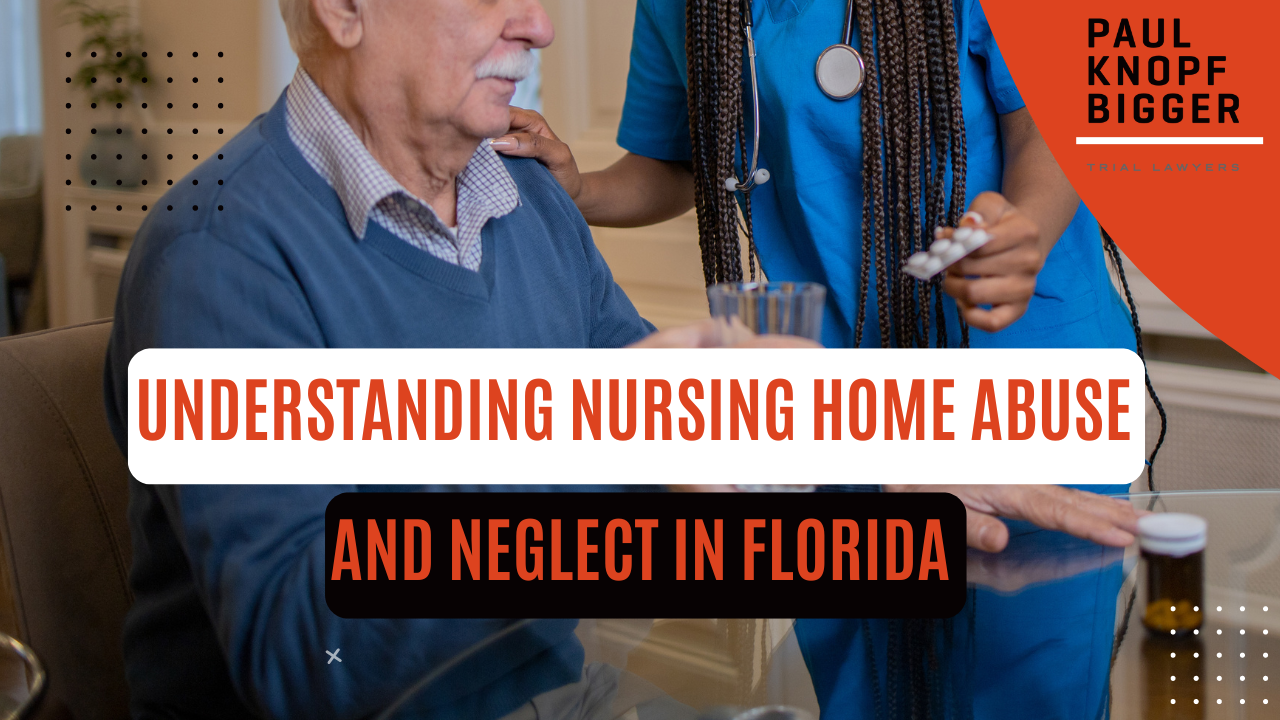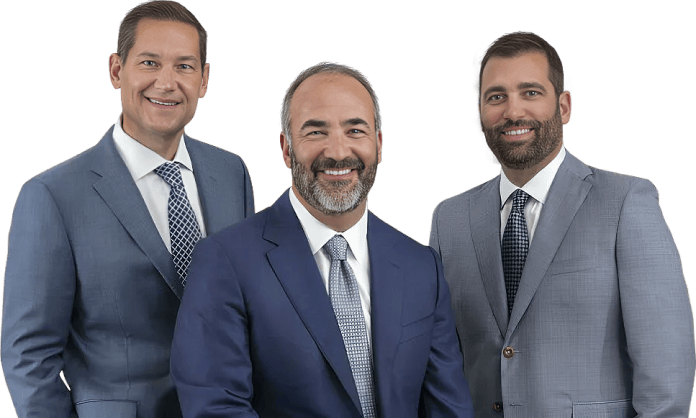
Understanding Nursing Home Abuse and Neglect in Florida
Choosing a nursing home for a loved one is a decision that families do not take lightly. Ensuring your elderly relative’s health, safety, and well-being are prioritized is paramount. Unfortunately, many seniors in Florida face abuse and neglect in these facilities, leading to severe injuries or even death. If you suspect that your loved one is a victim, an Orlando nursing home abuse attorney at Paul |Knopf | Bigger can help you seek justice and hold the responsible parties accountable. Contact us at (800) 434-4327.
What Constitutes Neglect in a Central Florida Nursing Home?
Neglect occurs when nursing home staff fail to provide adequate care. Common causes include:
- Understaffing: Insufficient staff to meet the residents’ needs leads to inadequate attention and care. This can result in missed meals, neglected hygiene, and unaddressed medical issues.
- Overworked Staff: Staff fatigue can lead to mistakes and neglect, as exhausted workers are more prone to errors and oversight. This can compromise the quality of care provided to residents.
- Inadequate Training: Staff may lack the necessary skills to provide proper care, resulting in improper handling of medical conditions and failure to meet residents’ daily needs. Proper training is essential for maintaining a safe environment.
- Insufficient Supervision: Lack of oversight can lead to missed care needs, with residents not receiving timely assistance. Effective supervision ensures that residents are monitored and supported at all times.
- Resident Isolation: Residents may isolate themselves or be isolated by staff, leading to unnoticed neglect and emotional distress. Social engagement is crucial for mental and emotional well-being.
Neglect can manifest physically, emotionally, and medically, impacting the resident’s overall well-being.
Physical Neglect
Physical neglect involves failing to meet the basic physical needs of residents, such as:
- Nutrition: Failing to provide adequate food and meals can lead to malnutrition and weakened immune systems. Proper nutrition is vital for maintaining health and energy levels.
- Hydration: Not ensuring residents have enough water can lead to dehydration and related health issues. Dehydration can cause serious complications, including kidney problems.
- Personal Hygiene: Neglecting to assist with bathing, grooming, and other hygiene needs, resulting in infections and skin conditions. Maintaining personal hygiene is essential for preventing illness and promoting dignity.
- Cleanliness: Not maintaining clean living quarters can create unsanitary conditions and increase disease risk. A clean environment is crucial for health and comfort.
- Supervision: Inadequate supervision leads to falls, choking, or wandering off, which can result in serious injuries. Proper supervision helps prevent accidents and ensures residents’ safety.
Bedsores are a significant indicator of physical neglect. These sores develop from prolonged pressure on the skin and can become severely infected if not properly managed, causing pain and severe health risks.
Emotional Neglect
Seniors also need emotional support and engagement. Emotional neglect can occur if:
- Social Isolation: Staff fail to encourage social interaction, leading to loneliness and depression. Regular social engagement helps maintain mental health and happiness.
- Emotional Support: Residents’ emotional needs are ignored, leading to anxiety or depression. Providing emotional support is essential for overall well-being.
- Behavioral Monitoring: Lack of supervision for self-isolating or distressed residents, which can exacerbate mental health issues. Monitoring behavior helps identify and address emotional problems early.
Neglected emotional needs can significantly deteriorate a resident’s quality of life, leading to severe mental health issues and decreased overall well-being.
Medical Neglect
Medical neglect happens when necessary medical care is not provided, such as:
- Medication Management: Incorrect or irregular medication administration can lead to ineffective treatment and potential health complications. Proper medication management is crucial for treating chronic conditions and preventing adverse reactions.
- Undiagnosed Issues: Failing to identify and treat infections, illnesses, or emergencies can lead to serious health deterioration. Early diagnosis and treatment are vital for recovery and management of health conditions.
- Medical Attention: Ignoring or delaying medical care for sick or injured residents, worsening conditions. Prompt medical attention is essential for effective treatment and recovery.
Medical neglect can lead to severe health complications and even life-threatening conditions, making timely and proper medical care indispensable.
Identifying Nursing Home Abuse
Abuse in nursing homes can be physical, emotional, sexual, financial, or medical. Unlike neglect, abuse is often intentional and can involve criminal acts. Recognizing the signs of abuse is critical for protecting residents and ensuring their safety. An Orlando nursing home abuse attorney can help you understand the different types of abuse.
Physical Abuse
Physical abuse includes:
- Assault: Hitting, kicking, choking, or any form of physical harm, which can cause severe injuries and trauma. Physical abuse is a direct violation of a resident’s rights and well-being.
- Restraint: Unlawful use of restraints to control or punish residents, leading to physical harm and emotional distress. Using restraints without proper justification is abusive and dangerous.
Emotional Abuse
Emotional abuse involves verbal or non-verbal actions that cause emotional distress, such as:
- Verbal Assaults: Shouting, insulting, or demeaning comments that can severely impact a resident’s mental health and self-esteem. Verbal abuse can lead to long-term psychological damage.
- Isolation: Keeping residents from seeing family or friends, which can lead to loneliness and depression. Social isolation is a harmful practice that deprives residents of essential emotional support.
Sexual Abuse
Sexual abuse can occur through:
- Unwanted Touching: Inappropriate touching or sexual assault, which can cause physical harm and severe emotional trauma. Sexual abuse is a grave violation of a resident’s dignity and safety.
- Sexual Comments: Making sexual remarks or forcing residents to view pornographic materials leads to emotional distress and humiliation. Such behavior is abusive and unacceptable.
Financial Abuse
Financial abuse involves exploiting residents’ financial resources, such as:
- Theft: Stealing money or belongings, depriving residents of their financial security. Financial theft is a breach of trust and can leave residents vulnerable.
- Fraud: Misusing credit cards, bank accounts, or altering wills, leading to significant financial loss. Financial fraud is a serious crime that can devastate residents and their families.
Medical Abuse
Medical abuse includes:
- Medication Misuse: Withholding medication or using it to control residents, resulting in health complications and suffering. Proper medication use is essential for maintaining health and well-being.
- Ignoring Medical Needs: Deliberately neglecting necessary medical care, which can lead to severe health deterioration. Medical abuse puts residents at significant risk and is a serious violation of care standards.
Signs of Nursing Home Abuse and Neglect
Families must stay vigilant for signs of abuse and neglect, including:
- Weight Loss: Unexplained severe weight loss, which can indicate malnutrition or health issues. Sudden weight loss is a red flag for neglect or abuse.
- Poor Hygiene: Dirty clothing or unkempt appearance, suggesting neglect of personal care. Poor hygiene can lead to infections and discomfort.
- Bedsores: Pressure ulcers indicate immobility without care, which can become infected and cause serious health problems. Bedsores are a clear sign of neglect.
- Behavioral Changes: Withdrawal, anxiety, or depression, indicating emotional abuse or neglect. Sudden changes in behavior should be investigated promptly.
- Unexplained Injuries: Bruises, fractures, or other injuries that cannot be reasonably explained, suggesting physical abuse. Unexplained injuries warrant immediate attention and investigation.
- Financial Irregularities: Missing money or changes in financial documents, indicating financial exploitation. Any unusual financial activity should be scrutinized for potential abuse.
Legal Recourse for Nursing Home Abuse
If you suspect nursing home abuse, contacting an Orlando nursing home abuse attorney promptly is crucial. Contact an attorney at Paul | Knopf | Bigger at (800) 434-4327.
Florida law mandates that claims must be filed within two years, making timely action essential.
An attorney can:
- Investigate: Gather evidence and witness testimonies to build a strong case. A thorough investigation is critical for uncovering the truth and ensuring justice.
- File Claims: File legal claims for compensation to address the harm suffered. Legal claims can help cover medical expenses and compensate for pain and suffering.
- Negotiate Settlements: Negotiate with the nursing home or pursue litigation to secure fair compensation. Skilled negotiation can often lead to favorable outcomes without prolonged court battles.
Compensation for Nursing Home Abuse
Victims of nursing home abuse may be entitled to compensation for:
- Medical Expenses: Current and future medical treatment costs ensure victims receive the necessary care. Compensation for medical expenses can alleviate the financial burden on families.
- Pain and Suffering: Physical and emotional distress caused by the abuse, recognizing the significant impact on victims’ lives. Pain and suffering damages acknowledge the profound harm inflicted.
- Out-of-Pocket Costs: Additional care-related expenses, such as transportation and specialized equipment. These costs can add up, and compensation helps cover them.
- Punitive Damages: In cases of gross negligence or intentional misconduct, to punish the wrongdoers and deter future abuse. Punitive damages serve as a strong message against negligent or abusive behavior
Paul | Knopf | Bigger – Your Orlando Nursing Home Abuse Attorneys
Nursing home abuse and neglect are grave issues that require immediate attention. If you believe your loved one is a victim, contact an Orlando nursing home abuse attorney at Paul | Knopf | Bigger to protect their rights and seek justice. Contact us at (800) 434-4327 or complete our contact form now.
Sources:
- https://www.cdc.gov/nchs/fastats/nursing-home-care.htm
- https://www.fhca.org/media_center/entry/florida_health_care_association_survey_92_of_florida_nursing_centers_face_staffing_challenges
- https://www.flhealthcharts.gov/ChartsDashboards/rdPage.aspx?rdReport=Death.Dataviewer&cid=0103
- https://www.ncbi.nlm.nih.gov/pmc/articles/PMC8110289/
 Skip Navigation
Skip Navigation



